Institute on Religion, Law and Lawyer's Work

Established in 2001
The Institute serves the increasing number of attorneys, judges, scholars and students who desire to integrate faith values and perspectives in the context of the challenges of legal practice.
Read moreReligious Lawyering: Defining Our Terms
What characterizes the "religious lawyering" conversation is its focus on how religious values and perspectives may provide a completely different structural framework for an approach to professional life
Religious lawyering insists that there should be room in the profession for lawyers to integrate religious perspectives and substantive critiques to the issues which arise not just at the margins, but at the heart of ordinary day-to-day legal practice.
It suggests that this is a conversation to be held not just within the quiet of one's individual conscience, but as an open dialogue and debate in law offices, in judge's chambers, in legislatures, and even in law schools.
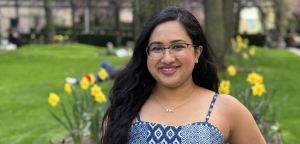
Class of 2024: Meet Shivani Parikh
Shivani Parikh ’24 knew she was interested in law since she was in the eighth grade. In high school, she interned at the Legal Aid Society of Rockland County, which …
Read The Full Story

Scholars Discuss the Right to a Healthy Environment at Institute on Religion, Law & Lawyer’s Work Seminar
In celebration of Earth Day, Fordham Law’s Institute on Religion, Law & Lawyer’s Work (IRLLW) invited a group of scholars to discuss the right to a healthy environment through a …
Read The Full Story

Celebrate Earth Day with Fordham Law
Join the Fordham Law community in celebrating the 53rd Earth Day (April 22) through various programs designed to educate and inspire action around themes of environmental justice and protection, climate, …
Read The Full Story
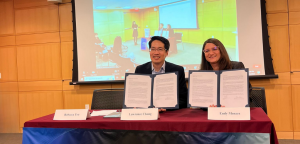
Institute on Religion, Law & Lawyer’s Work Signs Strategic Partnership With Consulus
Fordham Law’s Institute on Religion Law and Lawyer’s Work and Consulus, a global innovation by design firm, have signed a strategic partnership agreement to shape a new generation of lawyers …
Read The Full Story
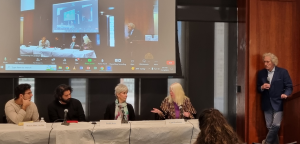
IRLLW Conference Looks at Intersection of Religion, Law, and Immigration
Fordham Law School’s Institute on Religion, Law, and Lawyer’s Work held a conference on November 14, 2022, looking at theological, legal, and contemporary implications related to immigration. The conference was …
Read The Full Story

Institute on Religion, Law and Lawyer’s Work Closes Out Semester Discussing the Future of Freedom of Religion
On May 20, the Institute on Religion, Law and Lawyer’s Work (IRLLW) at Fordham Law held its fourth and final expert panel discussion in its yearlong “New Frontiers of Human …
Read The Full Story

Institute on Religion, Law & Lawyer’s Work Invites Experts to Discuss Environmental Justice Strategies
Ahead of Earth Day, Fordham Law’s Institute on Religion, Law & Lawyer’s Work (IRLLW) invited a group of experts to discuss climate change, injustice gaps that pose a significant challenge …
Read The Full Story
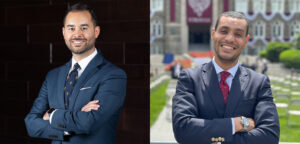
Two Fordham Graduates Make Middle East Policy Council’s ’40 Under 40’ List
Two Fordham graduates were recently named to the Middle East Policy Council’s inaugural cohort of 40 Under 40 awardees. Jayson Browder, PCS ’13, and Mohamed Sweify, S.J.D., LAW ’21, were …
Read The Full Story
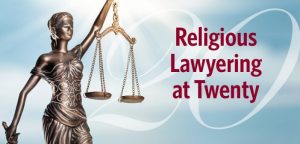
Two Decades Later, a Conference on Law and Religion Still Resonates
Twenty years ago, Fordham Law convened “Rediscovering Religion in the Lives of Lawyers and Those They Represent,” a conference that brought together lawyers, judges, students, and scholars looking to help …
Read The Full Story
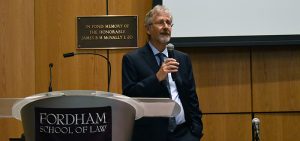
Fordham Hosts Third International Agunah Summit
On June 21–22, Fordham Law School hosted the Third International Agunah Summit featuring a keynote address by Israel Supreme Court Justice Neal Hendel as well as insights from leading scholars and …
Read The Full Story
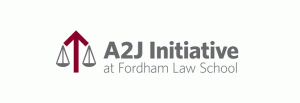
Access to Justice (A2J) at Fordham Law School
Access to Justice (A2J) at Fordham Law School Join the A2J Initiative at Fordham Law for a screening of clips from Rikers: An American Jail, the powerful documentary from acclaimed …
Read The Full Story
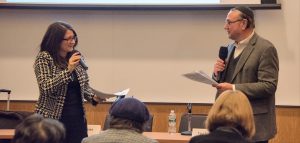
Legal and Business Experts Encourage Workplace Interfaith Dialogue
While individual members of a given workplace may subscribe to distinct religions, they can all share the belief in talking openly with coworkers and employers about their unique faith practices. …
Read The Full Story

Taking Ethics to a Higher Level
A conversation with five Fordham Law professors about ethics and professional responsibility. When it comes to being an ethical lawyer, the ABA Model Rules of Professional Conduct seem to be …
Read The Full Story
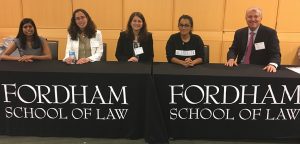
Event Examines Ideas Driving Domestic Violence Advocacy
Fordham Law School’s Access to Justice Initiative and the National Center for Access to Justice convened a distinguished panel of practitioners and scholars on domestic violence to highlight how a …
Read The Full Story
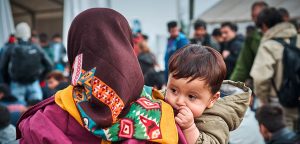
“Uncharted Waters” of Trump Immigration Order
Fordham Law School Professors Jennifer Gordon, Abner S. Greene, and Russell G. Pearce voiced concerns about the legality and constitutionality of President Donald Trump’s controversial executive order on immigration, during …
Read The Full Story
New Humanity and Law: Congress for Law Operators
Endy Moraes of the Institute on Religion, Law & Lawyer’s Work spoke on a panel during an international congress held in Rome on November 26 and 27. The event was …
Read The Full Story

Caring for Our Common Home
Fordham Law School students and faculty gathered on November 22 for a discussion of lawyers’ responsibilities in the face of climate change, framing their discussion with Pope Francis’s encyclical letter …
Read The Full Story
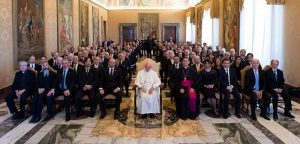
Dialogue Across Faiths
Members of the Fordham Law community attended a symposium on September 7 and 8 hosted by Pope Francis in Vatican City for the purpose of discussing interreligious cooperation toward the …
Read The Full Story
New York Gets First Private Law Firm Dedicated to Representing Religious Institutions
Institute on Religion, Law & Lawyer’s Work at Fordham Law School was featured in The Christian Post along with Nelson Madden Black LLP, who announced itself as the first private New …
Read The Full Story

A Choice Between Love and Hate
Against the backdrop of this fall’s divisive presidential election, Fordham Law Professors Russell Pearce and Olivier Sylvain joined leading religion and public policy thinkers at an event discussing how American …
Read The Full Story

Interview with Rabbi Tsvi Blanchard
In 2023, Fordham’s Center for Jewish Studies celebrates its fifth anniversary. This blog series features interviews with people who cultivated the study of Jews, Judaism, and Jewish history and culture at Fordham.
Read moreFollow the conversation on faith and legal practice